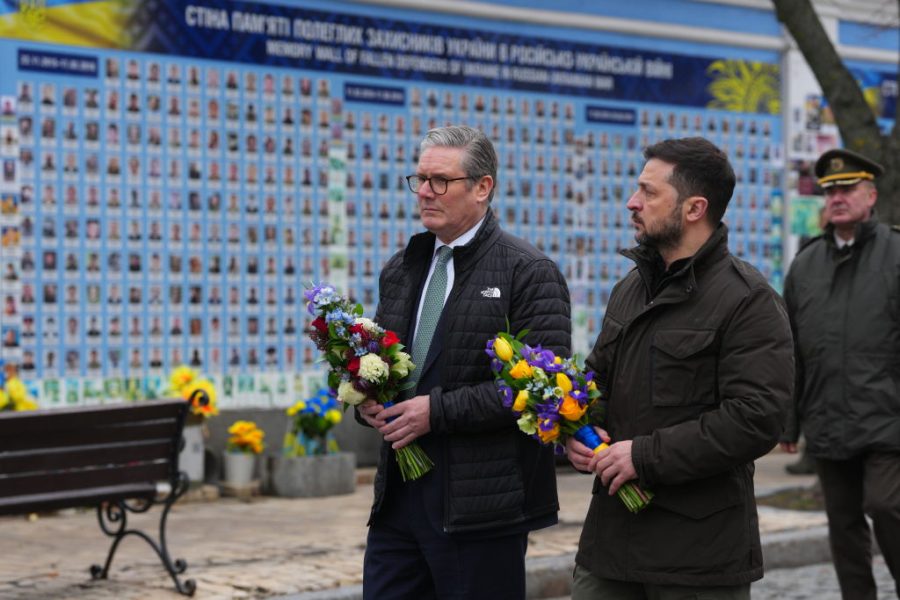Sir Keir Starmer arrived in Kyiv this morning. He came by train, crossing the border from Poland, since air travel into the Ukrainian capital is now unacceptably hazardous. Perhaps he regards this visit as a respite after the week’s event so far at Westminster.
The Prime Minister arrived to meet President Volodymyr Zelensky bearing gifts. The centrepiece is an extensive 100-year partnership agreement between the United Kingdom and Ukraine, covering nine ‘pillars’ from culture and education through science, technology and healthcare to security and military assistance. This is intended to be a significant and enduring relationship.
Since the general election, however, the support has seemed to some to have wavered
‘This is not just about the here and now,’ Starmer told the media. ‘It is also about an investment in our two countries for the next century… we are closer than ever, and this partnership will take that friendship to the next level.’
The duration of the agreement is purely a pose. It goes without saying that parliament cannot bind its successor, and, as the Prime Minister’s Labour predecessor Harold Wilson once quipped, a week is a long time in politics. With that in mind, Starmer would do well to remember that the Treaty of Perpetual Peace concluded between England and Scotland in 1502 lasted for a little more than ten years.
The importance of the agreement lies in its contents, and Ukraine’s pressing need remains military assistance. The UK was quick off the mark in supplying weapons to the Ukrainian armed forces in the immediate aftermath of Russia’s invasion in February 2022: within a few weeks, the government had already begun sending surface-to-air missiles and NLAW and Javelin anti-tank weapons.
Since the general election, however, the support has seemed to some to have wavered. Over the autumn, Ukraine’s former foreign minister, Dmytro Kuleba, had detected a weakening of momentum:
The Conservatives were coordinating with the Americans but they did not restrict themselves to just following the Americans. This is the change that came with Labour. They took a position they would follow the Americans.
Zelensky was particularly frustrated that Starmer would not authorise the use of British-supplied Storm Shadow cruise missiles against targets far behind the front line. Restrictions on their use were only lifted towards the end of November last year, and this rankled in Kyiv.
The new agreement refers to ‘lethal aid’ to fulfil Ukraine’s immediate military needs, and strengthened security in the Baltic Sea, the Black Sea and the Azov Sea. The UK has also now trained more than 50,000 Ukrainian service personnel as part of Operation Interflex, and this will continue until at least the end of 2025.
This is Sir Keir Starmer’s first visit to Ukraine, after six months in office, and that has not gone unnoticed. Yes, he has already met Zelensky six times elsewhere, including in London, and the defence and foreign secretaries, John Healey and David Lammy, have both visited Kyiv. But Boris Johnson and Rishi Sunak had much more prompt meetings with Zelensky on his home turf.
In politics, as in comedy, timing is everything. Next week Donald Trump will be sworn in again as president of the United States, and his enthusiasm for continuing support to Ukraine is known to be muted. His vice-president, JD Vance, outlined a ‘peace plan’ last September that would effectively confirm Russia’s possession of occupied territory and forbid Ukraine from joining Nato. The new president’s special envoy to Ukraine and Russia, retired US Army general Keith Kellogg, also favours a negotiated peace.
This puts the British government in a potentially awkward position. In his first week as prime minister, Starmer declared that he would maintain military support of £3 billion a year for as long as Ukraine needed it: ‘Whatever it takes, for as long as it takes to uphold our shared values and our shared security.’
This is not the same hymn sheet as that which the president-elect is holding. Although Trump’s aides are now privately walking back his childish braggadoccio that he would ‘have that war settled in one day’, Kellogg is talking publicly of a timeframe of 100 days, and repeated Republican opposition in Congress to Biden’s military support for Ukraine is ominous.
The United States has been the largest supplier of military assistance to Ukraine, amounting to (£54.5 billion) $66.5 billion as of this month. The UK has pledged £12.8 billion, the third largest donor after America and Germany. Nevertheless, US contributions amount to about half of all support to Ukraine: if this were to cease or be significantly reduced, other nations would not be able fully to make up the gap.
What is the Prime Minister’s purpose? Is his 100-year friendship a last roll of the dice before Western support drops substantially? Or is Starmer anticipating a strategic situation that may soon no longer primarily be a conflict, but a reluctant ceasefire and attempts to rebuild what Russia has destroyed in Ukraine?
The government is, again, attempting to have it both ways. Ministers talk misty-eyed of unwavering solidarity with Ukraine, but of a ‘black hole’ in the nation’s finances. Starmer talks of Vladimir Putin’s ‘monumental strategic failure’, but does not accept that Ukraine is only just holding on. Kyiv still needs our help: what is Plan B if Trump dismisses this as a European conflict? I don’t believe the Prime Minister has one. Do you?








Comments